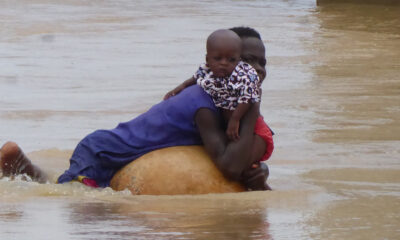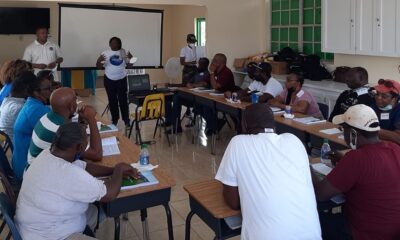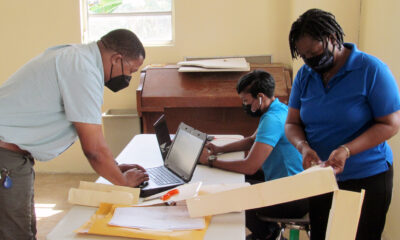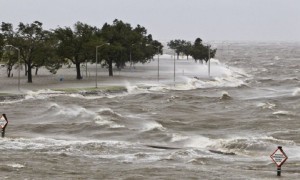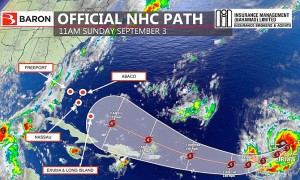By: Matt Maura
Bahamas Information Services
#TheBahamas, March 29, 2022 – Participants of the National Emergency Management Agency’s (NEMA) most recent Basic Community Emergency Response Team (CERT) Training Programme are singing the Agency’s praises, while urging other communities “to get on board,” following the conclusion of yet another successful exercise.
The CERT Programme educates community volunteers about disaster preparedness for the hazards that may impact their area while also training those volunteers in basic disaster/emergency response skills such as fire safety and utility controls, light search and rescue, team organization and disaster/emergency medical operations. CERT Training provides community volunteers with the skillset needed to do the greatest amount of good, for the greatest amount of persons in their communities in the shortest amount of time, until the Professional First Responders arrive, allowing those Professional First Responders to focus on more complex tasks.
Part I of the five-day CERT Training was held March 21-25 at the Chapel on the Hill Church Hall. Part II of the CERT Training opened Monday (March 28) and will conclude Friday, April 1. Both sessions are facilitated by members of NEMA’s Training Department, headed by Mrs. Lisa Bowleg, Training Coordinator.
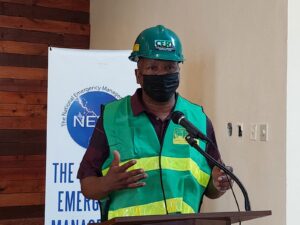
Reverend Clyde Bain, Jr
Reverend Clyde Bain, Jr., Disaster Coordination Team, the Assemblies of God in The Bahamas, including the Turks and Caicos Islands, and a survivor of Hurricane Dorian in 2019, deemed the National Emergency Management Agency’s CERT Programme an “absolute hand-in-glove fit” with the Church’s overarching role of being the “Watchman” over the communities it serves.
“The training was very, very enhancing and will help us in our efforts to build resilience not only within our Fellowship, but by extension, those communities within which we have churches. The CERT Programme is an absolute hand-inglove fit to what we are trying to achieve,” Reverend Bain said.
“The Church of the Lord Jesus Christ is required to be the Watchman over our cities and communities. As a Church, we are to be impacting the communities; we ought to be influencing our communities, and not just within the silo of the church, but through the kinds of efforts that will allow us to address the whole man, to address the needs of our communities. After undergoing this CERT Training, it is my belief that, by working along with NEMA and like agencies, we can expand the services we offer to the community – this time in the area of emergency/disaster assistance — and be that Light we have been called to be.”
Reverend Bain laid out this challenge to his fellow graduates.
“As we have engaged, and been partnering all week and have grown and learned all of the things that have been afforded to us by the Instructors, we must then now turn around and implement those things in our communities and understand that we have been given great power, and that we have been given even greater responsibility.
“As a disaster survivor in Hurricane Dorian, I want you to know that when I see a programme like CERT, I am encouraged that, from what we have been through, we are on the way to making our communities more resilient and if we are more resilient, we will be able to better mitigate when we have things like Dorian,” Reverend Bain added.
Miss Shaherah Adderley, President of the Baillou Hill Estates Homeowners Association (BHEHA) and the Baillou Hill Estates Neighbourhood Watch, said the Training allows the community to “join the national efforts and broaden our country’s human capital resources in times of our greatest needs.”
“It was a rousing, thought-provoking opportunity for us and it got us to think more about topics such as climate change, and about ways to mitigate hazards,” Miss Adderley said. “We learnt some very valuable information about a widerange of subjects such as disaster preparedness, CERT organizational structure, medical operations, psychology, fire safety and utility controls, light search and rescue operations and terrorism and community emergency response teams.
“It is through opportunities like these offered by NEMA and through partnerships with organizations such as the National Neighbourhood Watch Council, that communities can bond, grow and bring about a further, positive evolution that I am certain we would all like to experience. The Training was a very informative; very wholesome, very solid and even more than I expected. I was very excited to have been a participant and has now resulted in a Baillou Hill Estates Community Emergency Response Team.
“I would encourage every person residing in this country to take part in this training; it is time that you will appreciate and you can use the skillset gained to possible help save lives,” Miss Adderley added.
appreciate and you can use the skillset gained to possible help save lives,” Miss Adderley added.
Mr. Bernard Rolle, a member of the BHEHA, categorized that training as “eye opening.” He said Baillou Hill Estates is a “small, close knit” community that serves as home to first, second and third generation of families.
“The CERT training opened my eyes to a lot of things as far as the scope of lifesaving techniques made available to us,” Mr. Rolle said. “My knowledge before I came out was so limited. Now being able to understand the magnitude of the key role one can play in assisting persons in your community until the Professional First Responders arrive, especially when a disaster/emergency occurs, is gratifying.
“This is needed. Just the training/the knowledge we received alone, was amazing. Doing the greatest amount of good, for the greatest amount of persons in the shortest amount of time.”
Mrs. Benita Adderley, a Licensed Teacher and member of the Baillou Hill Estates Homeowners Association, said the training went beyond expectation.
“This course was awesome, really, really good,” Mrs. Adderley said. “I loved the fact that they facilitated both theoretical and practical components so that all of the theory, the principles, and the concepts they were trying to impart, we were able to actually put that into practice and that was really good because it brought it all to life for us as participants.
“This is going to help us significantly as a community. I urge other communities to get on board. This is awesome; you will not regret it. The Instructors are really, really good and have a wealth of knowledge; they are fun to work with because they are interactive and they try to make it fun; they give you real life scenarios so that you see and you feel everything that is happening so I would say it is an awesome, awesome, experience and the training is an asset. Other communities really, really, need to get on board and become CERT Communities,” Mrs. Benita Adderley added.
Photo Captions:
Header: Nine members of the Baillou Hill Estate Homeowners Association were among the most recent graduating class of the National Emergency Management Agency’s (NEMA) Basic Community Emergency Response Team (CERT) Training that concluded Friday (March 25) at the Chapel on the Hill Church Hall, Tonique Williams Darling Highway. Seated (from left) are: Instructor, Chief Petty Officer Romeiko Burrows; Captain Stephen Russell, Director, National Emergency Management Agency; Permanent Secretary Carl F. Smith, Office of Disaster Preparedness, Management and Reconstruction; Mrs. Lisa Bowleg, Training Coordinator, NEMA, and Mr. Wendell Rigby (Instructor). Standing (first row left) are Instructors Reno Williams, Petty Officer Kenrio Ingraham, and Leading Woman Marine Karia R. Smith (first row standing at far right).
Insert: Reverend Clyde Bain, Jr., Disaster Coordination Team, the Assemblies of God in The Bahamas, including the Turks and Caicos Islands and a Hurricane Dorian survivor, addressing the closing ceremony of the National Emergency Management Agency’s (NEMA) Basic Community Emergency Response Team (CERT) Training Friday (March 25) at the Chapel on the Hill Church Hall, Tonique Williams Darling Highway.
(BIS Photo/Mark Ford)
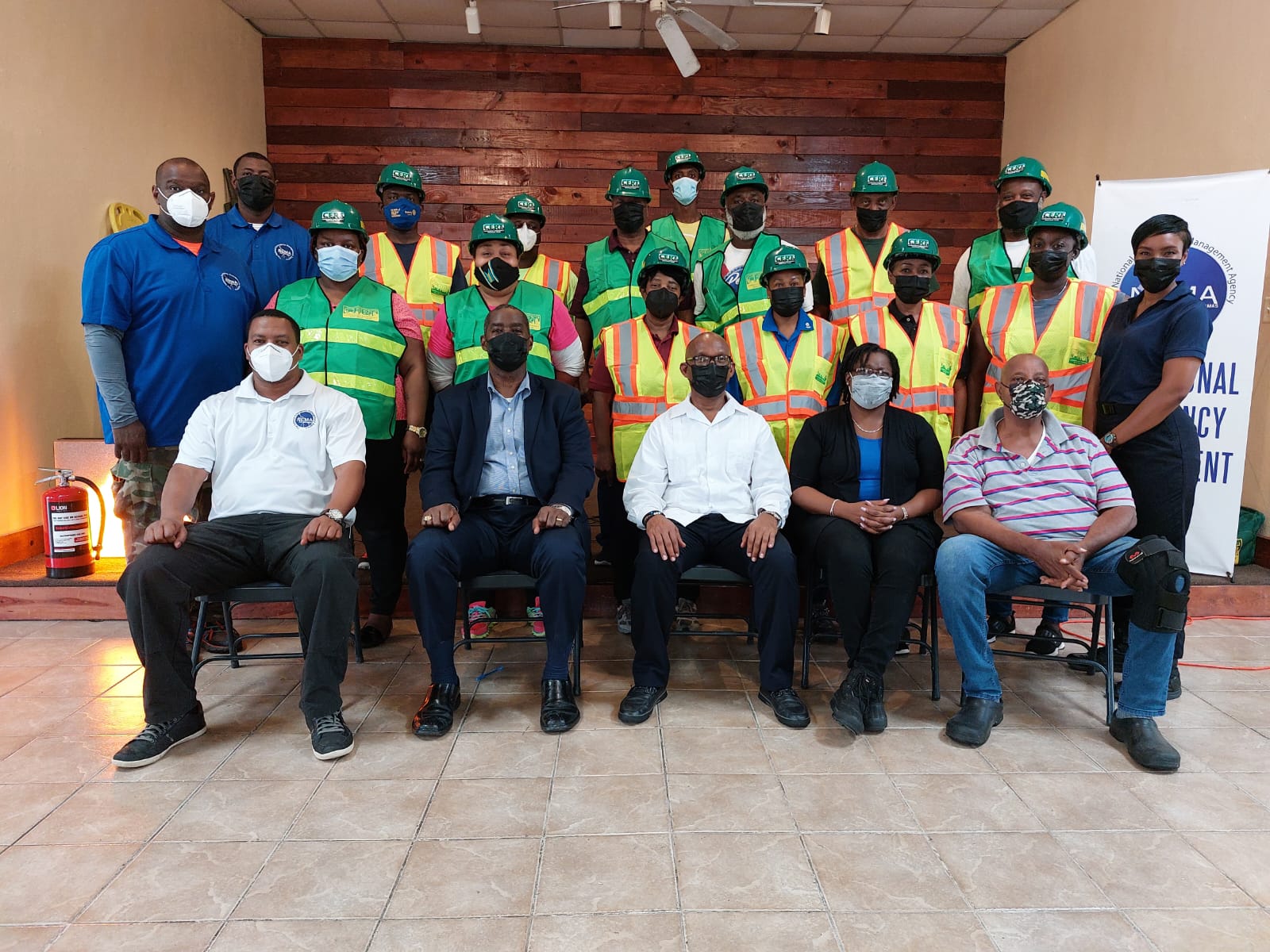

 Caribbean News7 days ago
Caribbean News7 days ago
 Caribbean News7 days ago
Caribbean News7 days ago
 Caribbean News1 week ago
Caribbean News1 week ago
 Caribbean News7 days ago
Caribbean News7 days ago
 Bahamas News7 days ago
Bahamas News7 days ago
 News7 days ago
News7 days ago
 Bahamas News1 week ago
Bahamas News1 week ago
 News7 days ago
News7 days ago


